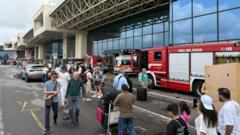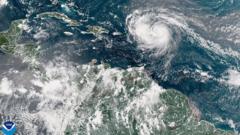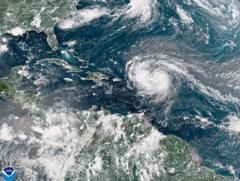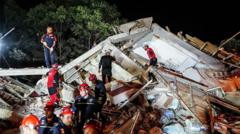A sudden torrent of water swept through the village of Bishnoi, causing widespread destruction and claiming at least 314 lives in Khyber Pakhtunkhwa. As the region grapples with heavy rains exacerbated by climate change, rescue efforts continue amidst the devastation left behind.
Catastrophic Flash Floods Claim Lives and Destroy Communities in Northern Pakistan

Catastrophic Flash Floods Claim Lives and Destroy Communities in Northern Pakistan
Hundreds have perished as relentless monsoon rains trigger devastating floods in Pakistan's Khyber Pakhtunkhwa province, erasing villages and sparking a desperate search for survivors.
Nestled among the lush green mountains of northern Pakistan, the village of Bishnoi was once a picturesque haven. However, in the early hours of August 15, a heavy downpour transformed tranquility into chaos. Villagers awoke to the destructive fury of a sudden torrent that surged through their community, uprooting trees and demolishing buildings in a matter of moments.
Local accounts reveal the terrifying scene as enormous rocks crashed through homes, obliterating the village. Israr Khan, a resident, painfully remarked, "There is a house under every stone. People try to look under these rocks to see if they can find someone." With rescue workers lacking heavy machinery, citizens resorted to small tools to clear the debris, desperately seeking their missing loved ones.
As the aftermath unfolded, the Province of Khyber Pakhtunkhwa was reported to have suffered at least 314 deaths and 156 injuries due to the relentless rains and flash floods, with the Buner district, home to Bishnoi, bearing the brunt of the disaster with 217 fatalities according to the Provincial Disaster Management Authority (PDMA). Disturbingly, many victims were caught in the midst of celebrations—weddings were disrupted, and homes were left in ruins.
The ongoing monsoon season, which lasts from June to September, traditionally brings much-needed rainfall to South Asia, but this year has brought unprecedented tragedy. With more than 507 deaths reported due to rain-related incidents since late June, the impact of climate change is stark. Experts point to global warming as a significant factor causing glaciers in Pakistan's mountainous regions to rapidly melt, heightening risks of landslides and flash floods.
Forecasts predict continued heavy rainfall through August 21, prompting officials to declare disaster zones in several areas. While some communities have stepped up for swift evacuations—like a principal who saved nearly 900 students from a raging flood—others faced harrowing losses. One heart-wrenching account detailed a father’s frantic calls in search of his wife and children, who tragically drowned in the floods.
In Buner, a local resident revealed that at least 27 individuals from his community remain missing, further underscoring the overwhelming scale of the crisis. Describing the scene, Asrar Khan shared, "It all happened before my eyes," highlighting the relentless force of the waters that showed no mercy.
Amid the devastation, resumption of daily life remains a challenge. Farmers' crops have been flattened alongside roads, vehicles are damaged, and shops in markets are submerged in mud. Yet, relief efforts have mobilized. Agencies like Al-Khidmat are hard at work, distributing aid and setting up medical camps. Residents and volunteers from surrounding areas have also come forth to lend a helping hand in recovery efforts.
As survivors search through the remnants of their lives, stories of loss intertwine with moments of hope. Amid the rubble, a glimpse of humanity persists as communities rally together, emphasizing resilience in the face of climate-driven disasters. The search for missing family members continues, as the nation stands united in the wake of this devastating catastrophe.



















